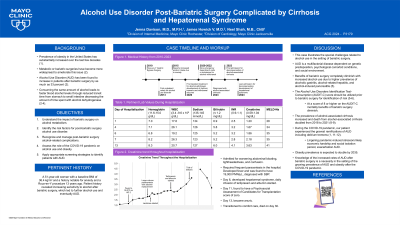Monday Poster Session
Category: Obesity
P3179 - Alcohol Use Disorder Post-Bariatric Surgery Complicated by Cirrhosis and Hepatorenal Syndrome
Monday, October 28, 2024
10:30 AM - 4:00 PM ET
Location: Exhibit Hall E

Has Audio

Jenna Davison, MD, MPH
Mayo Clinic
Rochester, MN
Presenting Author(s)
Jenna Davison, MD, MPH, James Howick V, MD, Neel Shah, MBChB
Mayo Clinic, Rochester, MN
Introduction: The prevalence of obesity in the United States has substantially increased over the last few decades. Metabolic surgeries became more widespread to ameliorate this issue but can have deleterious effects on patients. While patients are screened for alcohol and other types of substance use prior to bariatric surgery, the rates of alcohol use disorder (AUD) after surgery increase by as much as 33 percent.1 Here, we describe a patient that developed AUD after bariatric surgery and complications including decompensated alcohol-related cirrhosis and hepatorenal syndrome.
Case Description/Methods: A 51-year-old woman with a history of a BMI of 36.4 and Roux-en-Y gastric bypass (13 years ago) developed alcohol use disorder post-surgery, finding relief for anxiety through alcohol consumption. Despite attempts at outpatient treatment, her dependency on alcohol escalated, leading to a tumultuous medical history marked by recurrent alcohol withdrawals and subsequent complications. Over the years, she endured multiple hospital admissions for acute alcohol withdrawal, eventually complicated by delirium tremens. Despite efforts to manage her escalating health issues, including the initiation of lactulose, diuretics, and multiple paracenteses for ascites management, her condition continued to deteriorate resulting in her last hospitalization. Pertinent lab values during this hospitalization are summarized in Table 1. Complications included acute kidney injury, spontaneous bacterial peritonitis, and finally hepatorenal syndrome. Terlipressin was utilized to attempt to reverse hepatorenal syndrome. Despite comprehensive evaluation and treatment, she was deemed ineligible for liver transplantation and opted for comfort care, passing within a month.
Discussion: This patient’s sensitivity to alcohol heightened post bariatric surgery, leading to addiction. The case underscores the complex interplay between bariatric surgery, AUD, and cirrhosis. Prevalence of both obesity and AUD significantly increased during the COVID-19 pandemic, when the patient developed the most severe complications of AUD. Heightened awareness of AUD post-bariatric surgery and its complications, including hepatorenal syndrome, is crucial for comprehensive patient care amidst rising rates of obesity and alcohol misuse.
Note: The table for this abstract can be viewed in the ePoster Gallery section of the ACG 2024 ePoster Site or in The American Journal of Gastroenterology's abstract supplement issue, both of which will be available starting October 27, 2024.
Disclosures:
Jenna Davison, MD, MPH, James Howick V, MD, Neel Shah, MBChB. P3179 - Alcohol Use Disorder Post-Bariatric Surgery Complicated by Cirrhosis and Hepatorenal Syndrome, ACG 2024 Annual Scientific Meeting Abstracts. Philadelphia, PA: American College of Gastroenterology.
Mayo Clinic, Rochester, MN
Introduction: The prevalence of obesity in the United States has substantially increased over the last few decades. Metabolic surgeries became more widespread to ameliorate this issue but can have deleterious effects on patients. While patients are screened for alcohol and other types of substance use prior to bariatric surgery, the rates of alcohol use disorder (AUD) after surgery increase by as much as 33 percent.1 Here, we describe a patient that developed AUD after bariatric surgery and complications including decompensated alcohol-related cirrhosis and hepatorenal syndrome.
Case Description/Methods: A 51-year-old woman with a history of a BMI of 36.4 and Roux-en-Y gastric bypass (13 years ago) developed alcohol use disorder post-surgery, finding relief for anxiety through alcohol consumption. Despite attempts at outpatient treatment, her dependency on alcohol escalated, leading to a tumultuous medical history marked by recurrent alcohol withdrawals and subsequent complications. Over the years, she endured multiple hospital admissions for acute alcohol withdrawal, eventually complicated by delirium tremens. Despite efforts to manage her escalating health issues, including the initiation of lactulose, diuretics, and multiple paracenteses for ascites management, her condition continued to deteriorate resulting in her last hospitalization. Pertinent lab values during this hospitalization are summarized in Table 1. Complications included acute kidney injury, spontaneous bacterial peritonitis, and finally hepatorenal syndrome. Terlipressin was utilized to attempt to reverse hepatorenal syndrome. Despite comprehensive evaluation and treatment, she was deemed ineligible for liver transplantation and opted for comfort care, passing within a month.
Discussion: This patient’s sensitivity to alcohol heightened post bariatric surgery, leading to addiction. The case underscores the complex interplay between bariatric surgery, AUD, and cirrhosis. Prevalence of both obesity and AUD significantly increased during the COVID-19 pandemic, when the patient developed the most severe complications of AUD. Heightened awareness of AUD post-bariatric surgery and its complications, including hepatorenal syndrome, is crucial for comprehensive patient care amidst rising rates of obesity and alcohol misuse.
- Mellinger JL, Shedden K, Winder GS, et al. Bariatric surgery and the risk of alcohol‐related cirrhosis and alcohol misuse. Liver Int. 2021 Feb 20;41(5):1012–9.
Note: The table for this abstract can be viewed in the ePoster Gallery section of the ACG 2024 ePoster Site or in The American Journal of Gastroenterology's abstract supplement issue, both of which will be available starting October 27, 2024.
Disclosures:
Jenna Davison indicated no relevant financial relationships.
James Howick V indicated no relevant financial relationships.
Neel Shah indicated no relevant financial relationships.
Jenna Davison, MD, MPH, James Howick V, MD, Neel Shah, MBChB. P3179 - Alcohol Use Disorder Post-Bariatric Surgery Complicated by Cirrhosis and Hepatorenal Syndrome, ACG 2024 Annual Scientific Meeting Abstracts. Philadelphia, PA: American College of Gastroenterology.
